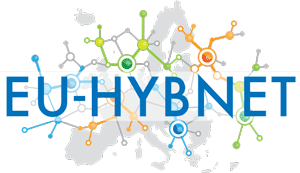Are you interested in becoming part of the European network of practitioners, industry, academia, and other actors countering hybrid threats?
EU-HYBNET is inviting applications from legal entities who are interested in becoming new network members, to contribute to problem scoping, innovation mapping, workshops, research, and training in order to increase the network participants’ capability to counter hybrid threats. If you wish to become a member of the Pan-European Network for countering hybrid threats, take part in EU-HYBNET activities, and gain access to project events and virtual platforms, please fill in the application form below:
By applying for membership, you confirm that you have read and agreed to our processing of your data as described here: Privacy & Agreement.
Who can apply?
The application is open to practitioners from the EU and Associated Countries. EU-HYBNET follows the European Commission definition of practitioners which states that “A practitioner is someone who is qualified or registered to practice a particular occupation, profession in the field of security or civil protection.” In addition, practitioners in the hybrid threat context are expected to have a legal mandate to plan and take measures, or to provide support to authorities countering hybrid threats.
The following practitioners can apply:
- ministry level (administration),
- local level (cities and regions),
- support functions to ministry and local levels (incl. Europe’s third sector).
In addition, EU-HYBNET network applicants may represent academia, industry, SMEs, and NGOs relevant to providing measures to counter hybrid threats.
EU-HYBNET Network accepts applications submitted by legal entities only, not by individuals in their personal capacity.
Eligibility criteria:
- Essential requirements
Entities from otherwise eligible non-EU countries with which the EU has not entered into an agreement on the security procedures for the exchange of classified information shall not be considered eligible to join the EU-HYBNET network.
Applicants must be European actors either from the EU Member States (MS) or from EU Associated Countries (AC), therefore they must have legal personality in an EU MS or AC. Applicants must name two contact persons as main contributors to the project and highlight their respective responsibilities in the prospective applicant’s structure.
Any applicant with criminal background cannot be accepted to become an EU-HYBNET network member. If this is discovered after a positive membership decision, the network member will be removed from the network.
2. Field Experience and Expertise
The applicant’s work must be relevant to at least one of the four EU-HYBNET core themes – the core themes are: Future Trends of Hybrid Threats; Cyber and Future Technologies; Resilient Civilians, Local Level and National Administration; Information and Strategic Communication. Additionally, the the applicant’s field of work would be considered relevant if it relates in particular to: countering hybrid threats and associated security risks and threats; providing relevant and quality information to practitioners engaged in security practices; analysing and studying security dynamics and practices to a recognized high quality level; providing services and/or material to practitioners in countering hybrid threats, relevant especially to their situational assessment or to their capacity to implement relevant actions. This criterion enables the applicant to demonstrate the fitness of its accession based on its existing work and field of expertise.
3. Network valuation
The applicant must extrapolate from the previous criterion to what extent it would be prone to provide niche knowledge, analysis or to generally enrich the discussion in the framework of the project and the four core themes. The prospective member’s potential for constructive engagement and added value to the work of EU-HYBNET is at the core of this criterion. In particular, network ability could be further weighed against the applicant’s willingness and capacity to lead a specific strand of work by providing analysis, commentary or leading discussion on a certain niche area.
What are the benefits?
Becoming a network member and participating in network activities is voluntary and free of charge for the duration of the EU-HYBNET project. It is the responsibility of the prospective members to evaluate the benefits they will reach upon collaboration within the EU-HYBNET network. The benefits offered to the network members include:
|
Services |
EU-HYBNET external stakeholder, wider audience |
EU-HYBNET network member |
|
Access to project resources |
|
|
|
Newsletter |
x |
x |
|
Access to public deliverables and project results (via project web-page, twitter and linked-in) |
x |
|
|
Access to Innovation Arena and Information sharing among key European actors |
|
x |
|
Access to latest research and innovation materials on hybrid threats (via TUOVI portal) |
|
x |
|
Access to network members’ contacts for new collaborative initiatives |
|
x |
|
Access to defined needs, gaps and innovations |
x/ innovations |
x/ gaps & needs and innovations |
|
Participation in EU-HYBNET events |
|
|
|
Participation to EU-HYBNET Gaps and Needs events |
|
x |
|
Participation in Innovation and Knowledge Exchange events |
x |
x |
|
Participation to EU-HYBNET Future Trends Workshop |
x |
x |
|
Participation in EU-HYBNET training events |
|
x |
|
Participation to EU-HYBNET Annual Workshop |
x |
x |
|
Participation to Task 4.3 workshops on innovation standardization |
x/ invitation |
x/ according to T4.3 need |
|
EU-HYBNET project events with other projects |
x/ invitation |
x/ invitation |
How the applications are selected?
Applications undergo review on a monthly basis so that applicants will receive an answer within two months from submitting the application. The decision is taken by the EU-HYBNET Project Management Board in close cooperation with Hybrid CoE.
Contacts:
EU-HYBNET Network Manager: Jari Räsänen. Laurea UAS, jari.rasanen@laurea.fi
Hybrid CoE project coordinator: Hanne Dumur-Laanila, hanne.dumur-laanila@hybridcoe.fi
